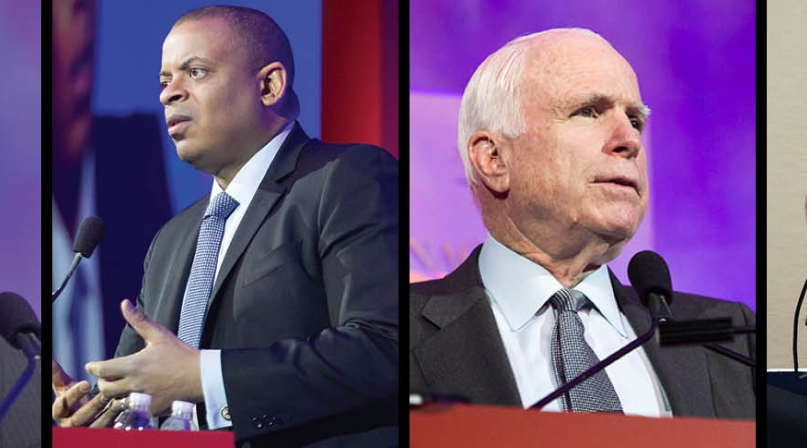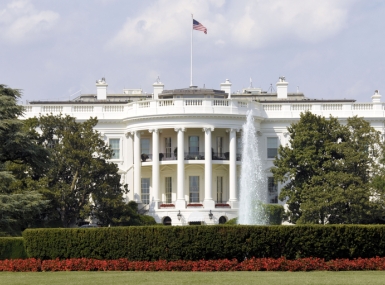Speakers assess trends in political climate
Upcoming Events
Related News

Chris Wallace, Sen. John McCain, Anthony Foxx and Dj PatilLegislative Conference attendees heard plenty of inside-the-Beltway perspective
Senate Majority Leader Mitch McConnell
While President Obama may have the constitutional responsibility to nominate a candidate to fill the late Justice Antonin Scalia’s seat on the Supreme Court, it’s the American people, through the next presidential election process, who should decide, according to Senate Majority Leader Mitch McConnell.
McConnell, who has already laid down a marker about the Senate’s not considering an Obama nominee, repeated his promise at the Closing General Session. “Let the people decide. The Senate will not be filling that vacancy this year,” he said.
But he also promised that despite election year politics, the Senate will make progress this year, especially in the areas of criminal justice reform and helping in the battle against substance abuse.
As Kentucky’s longest serving senator, McConnell got his political start in county government when he served as judge-executive of Jefferson County, Ky.
Secretary of Transportation Anthony Foxx
U.S. Secretary of Transportation Anthony Foxx announced $500 million in TIGER grants while addressing the Closing General Session.
The competitive grants go to projects that increase access to transportation and generate economic development, and applications are due April 29.
“We need to identify ways to make our system smarter, make our system more well integrated so that the assets and the facilities we have today can punch above their weight,” he said.
Foxx, formerly mayor of Charlotte, N.C., thanked NACo members for their work in lobbying members of Congress in support of what became the FAST Act, a five-year $305 billion surface transportation bill, which also included provisions for speeding up permitting for construction projects.
“I don’t think we’d have had a bill passed last year had it not been for the vigorous advocacy of your members,” he said. “It helps to have folks all around the country talking to their business community and their members of Congress.
“While the bill is not perfect...it serves as a bit of a down payment on what our system needs.”
What the transportation system needs will be dictated by population growth and economic shifts, both of which are examined in Beyond Traffic, a comprehensive study of the domestic transportation system now in the draft stage.
With the projected population growth of 70 million over the next 30 years, a corresponding 45 percent increase in freight volume could add 65 more trucks to the road, on top of non-commercial traffic.
Americans drove 3.15 trillion road miles in 2015, 150 billion more than 2014, but Foxx warned that more roads weren’t necessarily the answer.
“We can’t just build our way out of this congestion,” he said.
Sen. John McCain (R-Ariz.)
The nation’s armed forces were a major focus of Sen. John McCain’s remarks to conference attendees. He chairs the Senate Armed Services Committee. But he also touched on issues related to the environment, immigration and what he sees as the overuse of executive privilege by the White House.
He acknowledged improvements in the Department of Veterans Affairs since a scandal rocked his state some years ago, where 50 veterans awaiting treatment at the Phoenix VA Hospital died while on a “waiting list” that did not exist.
“It’s hard turning this giant bureaucracy around,” McCain said of the VA, “and I’m proud of Republicans and Democrats working together on this challenge that we all have.”
He advocated for further changes in the health care system for veterans — in particular — universal availability of a Choice Card that allows veterans to seek treatment from the provider of their choice. Currently, this option is only available to certain ex-military.
The VA provides the best care possible for traumatic brain injury, PTSD and prostheses, he continued, but the Choice Card would make it possible for former service members to receive care in their own communities.
“We have no greater priority than to care for those who have served and sacrificed on our nation’s behalf,” he said, drawing audience applause.
Later, he took questions from the audience on a range of topics.
In response to one, he disdained President Obama’s use of executive orders to subvert the will of Congress. In a nonpartisan spirit, he added, that applies to any president — current or future, regardless of party. To do otherwise, contradicts the system of checks and balances that the nation’s founders intended.
White House Deputy Chief Technology Officer DJ Patil, PhD
From his position as the White House’s chief data scientist, Tech Summit keynote speaker DJ Patil has seen a dramatic cultural transformation.
“Nerds are sexy again,” he said.
Speaking at the semi-annual NACo Technology and Innovation Summit, Patil said the proliferation of data-driven analysis, services and products, and the demand for analytic skills has helped that. And that appreciation goes to the top. “The president recognizes that data one of those fundamental lever arms that can change the trajectory of policies, progress and all of the things that we do,” he said.
With more and more data sources available to the public, the difference truly is made by who is interpreting and using the data.
“If everyone is looking at the data, you can solve problems faster,” Patil said. “When a government agency makes data available, it’s not the general public rushing in to look at it, it’s other departments...It refutes the notion you need someone to come in from Silicon Valley to rescue government. People in government need an opportunity to show what they can do.”
He explained how Miami-Dade County, Fla. was able to use data about its inmates to drive revisions to emergency dispatcher training which, when combined with crisis intervention team implementation, helped divert mentally-ill offenders to treatment, rather than the jail, which has reduced the inmate population enough that the county has closed one of its jails and saved $12 million in a year.
Perseverance, Patil said, was crucial to making data analysis work.
“There’s no company that got data policy right on the first three tries,” he said. In that process “you need a tolerance to know that you’re learning and the discipline to stay with it.”
He stressed the need for a data ethics component in training for data scientists. And he predicted the number of entities willing to share data would increase once they could find demonstrable benefit.
“(You’ll) want data to augment your decision making process,” he said. “People don’t have the same fear of data once they see how it’s being used to bring value to you.”
Chris Wallace
If Fox News Sunday host Chris Wallace ever quits his day job, he might have a future in stand-up comedy. He warmed up the Opening General Session audience with punchline after punchline before delving into the serious business of the current political landscape.
Wallace analyzed the field of presidential candidates’ chances of winning their party’s nomination. As has been the case throughout the primary season, Donald Trump’s name was mentioned often, both for the unlikeliness of his rise and concerns about his temperament.
Trump has a real shot at being the GOP nominee, Wallace said, but to grow his support, Trump is “going to have to stop making enemies he doesn’t need to make and ... build his coalition bigger than it is.”
As for the Democrats, Wallace said entrance polling of voters in Nevada’s Democrat caucus found Hillary Clinton with the most support from women and elderly voters, but Sen. Bernie Sanders was favored by more Hispanics. The Vermont senator’s biggest challenge, Wallace said, will be attracting black voters.
That shouldn’t be a problem for Clinton, who with her husband, has had “a 25-year relationship with African Americans.” This should stand her in good stead in South Carolina and other states that have large populations of black voters.
For all of the candidates, the trek to the nomination will be less about “retail” politics and more about “wholesale” from here on out, he said.
“Now it’s going to be fly and buy…. Nobody has the kind of ground game that they had earlier, so a lot of it is going to be wholesale politics where you go in, you hold a mass rally…and then you have to fly off to the next states,” he explained.
In this election year, neither Congress nor the president expect to get much accomplished, Wallace said, but there is some bipartisan agreement around criminal justice reform. For that reason, it has the best — if not only — chance of moving forward.
Charlie Ban, Beverly Schlotterbeck and Charles Taylor, County News staff, contributed to this report.
More Legislative Conference coverage
- Legislative Conference packed with insights, innovations and influence
- Steering committees explore new legislative policy
- Counties accept challenge to combat rural poverty
- Governors’ Roundtable discussion tackles persistent rural poverty
- Workshop: Keeping Counties Moving: Understanding the Role of Freight Transportation as an Economic Engine
- County leaders take criminal justice reform plans to Capitol Hill
- Legislative Conference Workshop: Counties on the Frontlines: The Escalating Substance Abuse Epidemic
- New group forms for LGBT leaders, allies
Attachments
Related News

County Countdown – June 30, 2025
Every other week, NACo's County Countdown reviews top federal policy advocacy items with an eye towards counties and the intergovernmental partnership. This week features the Senate reconciliation debate, transparency on sanctuary designations and more.

U.S. Department of the Interior announces PILT funding of $644.8 million to be distributed to counties
On June 24, the U.S. Department of the Interior (DOI) announced that over 1,900 state and local governments nationwide will receive $644.8 million in Payments in Lieu of Taxes program (PILT) funding for 2025. A complete list of funding by state and county is available here. You can also check NACo’s County Explorer for detailed county-by-county information on 2024 PILT funding levels.

DHS releases list identifying sanctuary jurisdictions; includes nearly 400 counties
NACo, along with the National League of Cities, and the International Municipal Lawyers Association, requested additional clarification on the methodology used to create the list, and noted concerns around the legal challenges that localities face when complying with ICE detainers. As of this time, NACo has yet to hear of a county receiving a formal notification that they were included on the list.